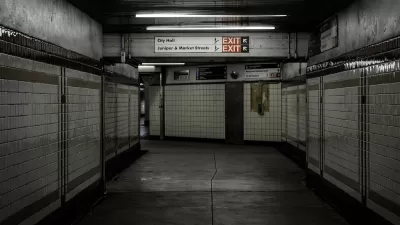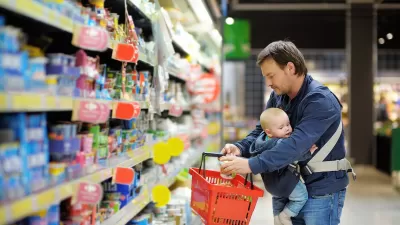With the highest obesity rate and poorest population of America’s big cities, Philadelphia is launching an ambitious plan to increase residents' access to healthy food, reports Sarah Kliff.
The cornerstone of Philly's plan is the corner store, where city officials are focusing their efforts to increase access to healthy foods by supplying some owners with new fridges to store produce and connecting them with wholesalers from whom they can buy at lower prices.
The plan is being funded by the federal government as part of the Obama administration's goal of eradicating food deserts by 2017.
However, as Kliff points out, "even as the White House has scaled up such efforts, a growing body of research has questioned its basic assumption: that people will eat better if given better options...To date, no study has found a causal relationship between improving access to healthy foods and improving health outcomes."
"That's where Philadelphia comes in," says Kliff. "Along with building the country's largest network of healthy corner stores, the city is conducting the largest study to date of what happens when nutritious options are introduced into neighborhoods that have traditionally gone without. It's measuring what people bought before, what they're eating now and whether that improves."
FULL STORY: Will Philadelphia’s experiment in eradicating ‘food deserts’ work?

Alabama: Trump Terminates Settlements for Black Communities Harmed By Raw Sewage
Trump deemed the landmark civil rights agreement “illegal DEI and environmental justice policy.”

Planetizen Federal Action Tracker
A weekly monitor of how Trump’s orders and actions are impacting planners and planning in America.

The 120 Year Old Tiny Home Villages That Sheltered San Francisco’s Earthquake Refugees
More than a century ago, San Francisco mobilized to house thousands of residents displaced by the 1906 earthquake. Could their strategy offer a model for the present?

LA’s Tree Emergency Goes Beyond Vandalism
After a vandal destroyed dozens of downtown LA trees, Mayor Karen Bass vowed to replace them. Days later, she slashed the city’s tree budget.

Sacramento Leads Nation With Bus-Mounted Bike Lane Enforcement Cameras
The city is the first to use its bus-mounted traffic enforcement system to cite drivers who park or drive in bike lanes.

Seattle Voters Approve Social Housing Referendum
Voters approved a corporate tax to fund the city’s housing authority despite an opposition campaign funded by Amazon and Microsoft.
Urban Design for Planners 1: Software Tools
This six-course series explores essential urban design concepts using open source software and equips planners with the tools they need to participate fully in the urban design process.
Planning for Universal Design
Learn the tools for implementing Universal Design in planning regulations.
Ada County Highway District
Clanton & Associates, Inc.
Jessamine County Fiscal Court
Institute for Housing and Urban Development Studies (IHS)
City of Grandview
Harvard GSD Executive Education
Toledo-Lucas County Plan Commissions
Salt Lake City
NYU Wagner Graduate School of Public Service




























